Prospect Park Zoo
The Prospect Park Zoo is a 12-acre (4.9 ha) zoo located off Flatbush Avenue on the eastern side of Prospect Park, Brooklyn, New York City. As of 2016, the zoo houses 864 animals representing about 176 species, and as of 2007, it averages 300,000 visitors annually. The Prospect Park Zoo is operated by the Wildlife Conservation Society (WCS). In conjunction with the Prospect Park Zoo's operations, the WCS offers children's educational programs, is engaged in restoration of endangered species populations, runs a wildlife theater, and reaches out to the local community through volunteer programs.
| Prospect Park Zoo | |
|---|---|
 Prospect Park Zoo logo | |
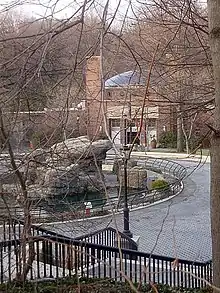 | |
| 40°39′57″N 73°57′52″W | |
| Date opened | 1890 (a menagerie); July 3, 1935 (city zoo);[1] October 5, 1993 (wildlife conservation center)[1] |
| Location | 450 Flatbush Avenue, Brooklyn, New York, United States 11225, in Prospect Park |
| Land area | 12 acres (4.9 ha)[2] |
| No. of animals | 864 (2016)[3] |
| No. of species | 176 (2016)[3] |
| Memberships | AZA[4] |
| Public transit access | New York City Subway: New York City Bus: B16, B41, B43, B48, B61, B67, B69 |
| Website | www |
Its precursor, the Menagerie, opened in 1890. The present facility first opened as a city zoo on July 3, 1935, and was part of a larger revitalization program of city parks, playgrounds and zoos initiated in 1934 by Parks Commissioner Robert Moses. It was built, in large part, through Civil Works Administration and Works Progress Administration (WPA) labor and funding.[1]
After 53 years of operation as a city zoo run by the New York City Department of Parks and Recreation, Prospect Park Zoo, also colloquially known as "Brooklyn Zoo", closed in June 1988 for reconstruction.[5][6] The closure signaled the start of a five-year, $37 million renovation program that, save for the exteriors of the 1930s-era buildings, completely replaced the zoo. It was rededicated on October 5, 1993, as the Prospect Park Wildlife Conservation Center, as part of a system of four zoos and one aquarium managed by the WCS,[lower-alpha 1] all of which are accredited by the Association of Zoos and Aquariums (AZA).
Features
The Prospect Park Zoo is part of the Wildlife Conservation Society, an integrated network of four zoos and an aquarium spread throughout New York City.[lower-alpha 1] Located at 450 Flatbush Avenue, across from the Brooklyn Botanic Garden, the zoo is situated on a 12-acre (4.9 ha) plot[2] somewhat lower than street level in Prospect Park. Visitors may enter through the Flatbush Avenue entrance or from within Prospect Park, near Leffert's Homestead and the Carousel.[7]
In 2007, 234,000 people visited the Prospect Park Zoo,[8] about the same as the 2006 level of 235,000.[9] As of the Wildlife Conservation Society's 2016 census of its zoos, Prospect Park Zoo had 864 animals representing 176 species.[3]
Exhibits
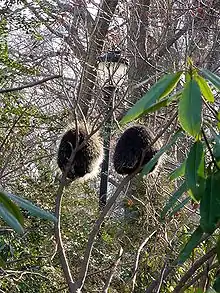
The zoo presents three themed exhibition venues, each housed in a dedicated building.
World of Animals
The World of Animals in the southern quadrant of the zoo, features the Discovery Trail. The trail begins in the World of Animals building, but visitors quickly pass to an outdoor path that winds through the southern third of the zoo. Animals from diverse corners of the globe are shown in settings not unlike their natural habitats. Visitors may find along the trail black-tailed prairie dogs, porcupines, red pandas, emus, dingos, North American river otters, and other animals.[10] Signs often ask challenging questions, reinforcing presentations made in the zoo's Discovery Center, or alert viewers to look for signs of animal habitation. Along one part of the Discovery Trail, young visitors may crawl through "underground burrows" to observation posts roofed with clear, hemispherical observation ports. They may observe prairie dogs in the ground, right in the midst of the animals themselves.[11]
Animal Lifestyles
Animal Lifestyles, in the western quadrant of the zoo, features indoor habitat exhibits. Visitors in the foyer of the building are shown Life in the Water, Life in Air, and Life on Land dioramas. Each diorama holds a carefully controlled environment that features select animals. These central displays broadly relate animals to their surrounds. Exhibits featuring more specific biota branch off from the central foyer. Side exhibits center on pallas cats, cotton-top tamarins, meerkats, emerald tree boas, dwarf mongooses, desert monitors, among others. Some of these exhibits feature critically endangered animals.[12] The Prospect Park Zoo is engaged in breeding species in captivity, a part of the larger wild life recovery program of the Wildlife Conservation Society.[13]
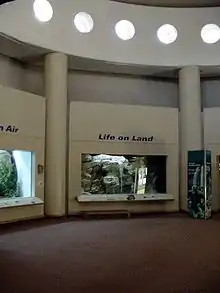
The main Animal Lifestyles exhibit consists of a troop of hamadryas baboons.[11] Zoo visitors may observe the troop in a large glassed-in gallery which looks out into a rocky outcrop. Small caves in the outcrop lead to interior burrows where the animals may avoid inclement weather. The rear wall of the gallery illustrates common forms of baboon signalling and behavior, along with other social aspects of the animals. Ample seating allows visitors to observe the troop.
Animals in Our Lives
Animals in Our Lives in the northern quadrant of the zoo has both indoor and outdoor exhibits illustrating relationships between animals and people and animal adaptations. The Animals in Art themed area occupies one side of the Animals in Our Lives building. The other side of the building showcases animals and their adaptations for a variety of survival needs.[14]
A small working barn further north of the building contains the Animals in Our Lives exhibit. It is organized around a working barn with sheep, cows, goats, ducks, geese and other animals.[11]
Educational programs
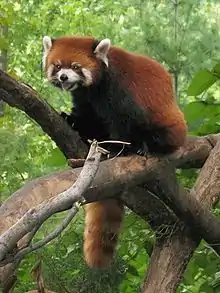
The zoo hosts educational venues as well as exhibits. These revolve around the Discovery Center, a building with classrooms and laboratories designed to introduce school-age children to investigative practices of environmental and wildlife scientists. The Discovery Center introduces children to laboratory practices; they learn about and use professional laboratory equipment and learn how to integrate what they observe into zoological theory.[15] These programs are based on educational concepts developed through WIZE (Wildlife Inquiry through Zoo Education), a program developed by Bronx Zoo educators.[16]
The volunteer program at the Prospect Park Zoo engages members of the community; it is a combination outreach and educational program for adults. Volunteer guides conduct tours for visitors, while volunteer docents augment the educational program. Docents enroll in a four-month training program.[17]
Facilities
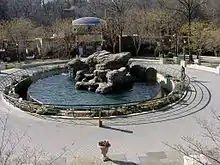
The zoo grounds and building exteriors were designed by Aymar Embury II.[18] The facility consists of six red brick and lime-stoned trimmed buildings grouped in a semi-circular arrangement around a central courtyard with the sea lion pool occupying the center of the court.[19] The building exteriors date to the 1930s while the interiors were built during the 1989–1993 reconstruction.[11] There is a freestanding wooden barn just north of the circular group of buildings. A set of stairs from the main entrance leads visitors down to zoo level. A small restaurant and the administrative center is immediately to the left, occupying the southeastern quadrant of the zoo. The Discovery Center is immediately to the right, occupying the northeastern quadrant of the zoo. Arrayed in front of the visitor are the three exhibit buildings, The World of Animals to the south, the Animal Lifestyles building, behind the sea lion pool directly in front of the visitor, Animals in our Lives is to the right.[10]
History
First menagerie
The original 1866 proposal of Prospect Park featured a "Zoological Garden" on the western flank of the park, near the present Litchfield Villa, but the garden had not been started by the time Frederick Law Olmsted and Calvert Vaux separated from the park in 1874.[18] This notwithstanding, a few features of the original park design did serve zoological purposes. A Wild Fowl Pond, once occupying the northern quadrant of the zoo grounds, served as a haven for water birds. A Deer Paddock, once occupying the southern quadrants of the zoo grounds, was a penned-in area for deer. In addition, a flock of sheep regularly maintained the grass in the park meadows and were kept in a paddock on the eastern flank of Sullivan Hill, near the now-demolished Dairy Farmhouse.[18]
Interest in zoological gardens flowered in the last decade of the 19th century. An informal Menagerie began to take shape within Prospect Park in May 1890 when the newly appointed president of the City of Brooklyn Parks Commission, George V. Brower, donated "three young cinnamon bears."[20][21] State Treasurer Harry Adams followed with a donation of three white deer, establishing a pattern. It was mainly through donations of animals by rich or prominent individuals that the Menagerie grew. By 1893, one observer noted that “seven seals arrived, one buffalo, from the estate of Samuel B. Duryea, three red foxes, three bears, one sacred cow, two white deer, five red deer, seven seals, and twelve to fifteen peacocks."[22]
The animals were kept in pens on Sullivan Hill, situated across the East Drive from the zoo's present location, near the sheep paddock and northeast of the Dairy Farmhouse.[23][24] Of the original zoological facilities in the park, the Deer Paddock, located near the present Carousel, was converted into a meadow and the deer were moved to the new Menagerie, The Wild Fowl Pond remained, located on the east side of the park in a low area now forming the northern part of the zoo. The Menagerie continued to accrue animals in the first decades of the 20th century. These were generally donated by prominent individuals and institutions and formed a varied collection of specimens both native to North America and other regions of the world.[22][25] A two-story brick building was opened in the Menagerie in 1916, housing monkeys, some small mammals, and several birds.[26] An elephant house in the zoo was announced in 1930,[27] and a heating system was proposed for the elephant house in 1932.[28][29]
Modern zoo creation
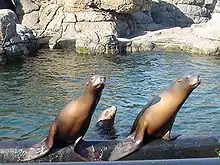
After assuming office in January 1934, New York City mayor Fiorello La Guardia hired Robert Moses to head a newly unified Parks Department. Moses soon prepared extensive plans to reconstruct the city's parks, renovate existing facilities and create new swimming pools, zoos, playgrounds and parks. Moses acquired substantial Civil Works Administration, and later, Works Progress Administration funding and soon embarked upon an eight-year citywide construction program, relieving some of the high unemployment in New York City in this Depression year.[30] Aymar Embury II prepared plans for the new zoo,[31][32] which were announced in March 1934.[33][34] The new zoo was to be located between the Wild Fowl Pond and former Deer Paddock on the east side of the park, across the East Drive from the Menagerie[18] and slightly north of Willink Plaza and the Lefferts Historic House.[35][36] Work on preliminary excavations had already started when Embury's plans were officially announced.[34][35]
Embury designed a half circle of six brick buildings centered on a seal pool.[18][34][36] Built of red brick with limestone trim, the buildings featured bas-relief scenes from Rudyard Kipling's The Jungle Book.[18] Five sculptors executed a total of thirteen such scenes, not only on the front and back walls of zoo buildings, but also on all four sides of both brick entrance shelters at Flatbush Avenue. However, the positioning of some of the bas-reliefs makes them less accessible than others.[33][37] The buildings constituted an integrated facility and were seen as a great improvement over the somewhat haphazardly developed Menagerie. The zoo featured an extensive bear pit, a seal pool, a lion's house (the current Animals in our Lives building) an elephant's house (the current Animal Lifestyles building), and a house for monkeys, birds, and horned animals (now the World of Animals building).[33] These structures were to be accessed by a grand stair on Flatbush Avenue.[36] In late 1934, the Brooklyn Daily Eagle reported that the zoo was to be completed the next March.[36]
New York governor Al Smith was tasked with finding animals for the new exhibits in May 1935,[38] and zoo officials began raising $50,000 that month to acquire animals.[39][40] Samuel Klein of department store S. Klein provided $5,000 to buy animals for 25 cages,[41] and Smith requested animals from states such as Vermont, Connecticut, and Virginia.[42] Animals began arriving at the zoo at the end of June 1935.[43] The new Prospect Park Zoo was dedicated on July 3, 1935,[19][44] and received 150,000 visitors on its first day.[45] Only three of the five planned structures were completed at that time.[46] Moses and La Guardia, who had missed the zoo's official opening, toured the facility later that month.[47] Tens of thousands of local children suggested names for the zoo's animals,[48] who were formally given monikers at a ceremony in September 1935.[49][50] Upon the new zoo's completion, the Dairy Farmhouse, sheep paddock, and Menagerie were demolished, and the sheep flock in Prospect Park were supplanted by mechanical mowers.[18]
Mid- and late 20th century
From the 1930s to the 1980s, the zoo served as a showcase of large animals from far away places, appealing to a sense of wonder. An estimated one million people visited the Prospect Park Zoo annually prior to World War II, but attendance gradually declined, reaching about a half million by the early 1980s.[51]
Early years
In its first few months of operation, the zoo recorded an average of 100,000 daily visitors.[52] The zoo initially had 131 animals and 56 birds[46] and recorded two million visitors in its first ten months.[53] Within two years of the zoo's opening, numerous animals joined the collection, such as elephants,[54] a buck and doe,[55] a boa constrictor, anteaters, and lizards.[56] In addition, some animals were bred in the zoo, such as a brown bear,[57] leopards,[58] and several litters of lions.[59] The zoo had 125,000 weekly visitors by mid-1937, some of whom went too close to the animals' cages or exhibits, prompting police to patrol the zoo.[60] Zoo officials announced in 1939 that they would build a ramp around the elephant enclosure, following separate incidents in which one elephant was killed and another was injured.[61][62] Officials also announced plans to reinforce the walls of the kangaroo enclosure after a kangaroo escaped into the streets of Brooklyn.[61] Ronald Cheyne-Stout, who had been appointed as the zoo's director when it reopened, was removed from his position in 1939.[63]
The number of animals in the zoo increased through the 1940s, and officials held competitions where children named the new animals.[64][65] In addition, Works Progress Administration laborers built a 60-by-30-foot (18.3 by 9.1 m) hay barn in the zoo in 1940.[66] Visitors frequently tossed items into the zoo's enclosures, which killed many of the animals by 1943, including one elephant, 45 monkeys, and all of the zoo's seals.[67] As a result, the police began strictly enforcing a rule banning patrons from feeding animals.[68] In 1948, the city government provided $10,000 to purchase additional animals for the Central Park and Prospect Park zoos.[69][70] Several animals were also born at the zoo in the late 1940s and the 1950s, such as a zebra,[71] bear cubs,[72] a llama,[73] and a hippo.[74] Zoo officials also expanded the collection by buying animals such as elephants.[75] The U.S. government gave $615,000 for the restoration of the Prospect Park Zoo and other parts of the park in 1966.[76] Many of the zoo's cages were widened in the late 1960s.[77]
Decline
As early as 1967, zoo superintendent Ronald Ellis said the animals were so frequently abused that all of the animals had to be moved indoors at night. At the time, anyone could walk into the zoo from the street.[78] In response to a 1967 report in the New York Daily News, the city doubled the number of security guards at the zoo at night.[79] Writing in New York magazine in late 1970, writer Erik Sanberg-Diment termed the zoo the 'rattiest' in New York – "in the literal sense of the word. (I've never been there without seeing several rodents romping in the bear lair)."[51] He reported that one of the zoo's earliest residents, a Southern United States black vulture, "…is still there, looking down his beak at visitors littering the walks, and celebrating his 35th anniversary in the same old cage."[51]
During the 1970s, there were multiple incidents involving animal injuries or deaths. This included the scalding death of a monkey in 1975, allegedly by a zoo employee, as well as an acting zoo director who was accused of shooting at pigeons and killing zoo animals.[80][81] A zoo employee also locked himself in a monkey enclosure for several hours in 1974 to protest the deaths of ten animals.[82][81] These incidents, as well as several others at the Central Park Zoo, prompted protests by animal-rights groups who wanted to close the two zoos and move the animals to the larger Bronx Zoo.[81] After fifteen years of sporadic conversations, the Koch administration and the NY Zoological Society (now Wildlife Conservation Society) signed a fifty-year agreement in April 1980, wherein the Central, Prospect, and Queens zoos would be administered by the Society.[83]
By the 1980s, a New York Times reporter quoted a zoo supervisor as saying: "Vandalism is a major problem, and deterioration is overtaking repairs."[83] According to the supervisor, one of the zoo's bears frequently had bloodied feet because of all the litter in the zoo.[83] Activists were pressing for major renovations of the zoo, which, in 1983, was rated by the Humane Society of the United States as one of the "10 worst" zoos in the country.[84] Others felt that a zoo was not in keeping with the original design of Prospect Park and urged its complete removal from the grounds.[18] The May 1987 mauling death of Juan Perez, an 11-year-old boy scaling the fence to the polar bear pit, underscored the difficulties with the fifty-year-old facility.[85] By late summer 1987, an $18-million, 2.5-year renovation plan[84] was put forth to renovate Prospect Park Zoo and coordinate its venue with other facilities to avoid redundant programming. Prospect Park Zoo was slated to specialize in children programs and house smaller, non-aggressive animal species.[84][86]
Renovation and repurposing
The Prospect Park Zoo closed to the public in June 1988. Over the next six months, new homes were found for the displaced animals in other zoos throughout the US.[86] Demolition was managed by the Parks Department and began in June 1989. The renovation was originally estimated to cost $18 million and take two and a half years.[84] The exteriors of the Aymar Embury buildings were preserved, but badly deteriorated interiors were gutted, pits and cages were demolished, and new structures were built. The facilities were turned over to the NY Zoological Society in April 1993.[16][86] The Society aimed to designate each of its three small zoos with a specific purpose. The Central Park Zoo would be focused toward conservation; the Prospect Park Zoo would be primarily a children's zoo; and the Queens Zoo would become a zoo with North American animals.[87]
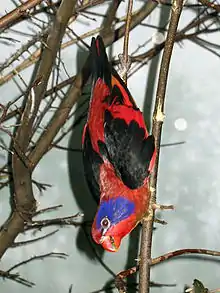
The project was not complete until April 1993; it had cost $37 million in total.[86] A further six months were needed to repopulate the zoo, prepare exhibits, and ready the facility for the public. The re-purposed zoo opened on October 5, 1993, and renamed the "Prospect Park Wildlife Conservation Center".[86] The Zoological Society hoped that the new name would suggest that the "Wildlife Conservation Center" was far more than a mere "zoo"; it was indeed a facility designed to preserve animal species. This name change coincided with the renaming of the zoological society to the "Wildlife Conservation Society".[88]
The programs of the new center were geared toward educating children. Classrooms for the Discovery Center were housed in a dedicated building on the north wing of the zoo. Exhibits housed smaller species, eschewing elephants, tigers, and lions, and augmented displays with interactive exhibits.[86]
21st century
The WCS, which supports the Prospect Park Zoo through a combination of private funds and subsidies from the city, is vulnerable to funding shortfalls such as the one on April 15, 2003, when Mayor Michael Bloomberg published his "doomsday budget" proposal for the fiscal year beginning in July 2003. To help close an overall $3.8 billion budget deficit, the Mayor proposed to cut all city funding for the Prospect Park Zoo and the Queens Zoo,[89] which were the smallest WCS facilities and had the lowest annual attendance rates, approximately 200,000 each. In contrast, the Bronx Zoo boasted annual attendance of two million and the Central Park Zoo saw one million visitors annually.[9] City Council Speaker Gifford Miller visited the zoo that June, estimating that the city would save $6 million but that the WCS would have to spend $8 million to decommission the zoos and find homes for 160 displaced animals. If the estimates were correct, it would be cheaper to run the zoos than to shut them down.[90][91]
By the start of the new fiscal year in July 2003, the approved budget restored a reduced funding level to the affected WCS facilities. To keep the Prospect Park and Queens zoos open, the WCS had to close two classroom-based instructional programs, lay off the supporting full- and part-time instructors, and double admission fees.[92] Funding levels for the Wildlife Conservation Society were restored in the 2007 city budget, though vulnerability to shortfalls remained.[93] In the opening months of 2009, the WCS itself faced the prospect of losing its fiscal year 2010 New York State funding.[94]
The Prospect Park Zoo's Discovery Center reopened in December 2012 following a renovation. The discovery center included a children's play area, puzzle area, stage, activity boxes, and reading areas.[95] In March 2020, the Prospect Park Zoo and the WCS's other facilities were shuttered indefinitely due to the COVID-19 pandemic in New York City.[96] The zoo reopened that July.[97][98] The zoo again closed indefinitely following the September 2023 New York floods, during which basements were flooded with up to 25 feet (7.6 m) of water.[99][100]
References
Notes
- The others are the Bronx Zoo, Central Park Zoo, Queens Zoo, and New York Aquarium.
Citations
- "Historic Places: Zoo". Prospect Park Alliance. Archived from the original on July 24, 2008. Retrieved August 30, 2008.
- Wildlife Conservation Society (Summer 2007). "Prospect Park Zoo (prospectparkzoo.com) Visitor Brochure". 200/603. Wildlife Conservation Society.
{{cite journal}}: Cite journal requires|journal=(help) -
Wildlife Conservation Society (December 2016). "Annual Report 2016" (PDF). Wildlife Conservation Society: 176 (PDF p. 81). Retrieved January 31, 2019.
{{cite journal}}: Cite journal requires|journal=(help) - "Currently Accredited Zoos and Aquariums". aza.org. AZA. Retrieved May 27, 2010.
- Long, L.H. (1966). The World Almanac and Book of Facts: 1966. New York World-Telegram. p. 320. Retrieved December 28, 2018.
Brooklyn Zoo Is In Prospect Park, and has entrances on the East Drive In the Park and on Flatbush Ave. The animals have modern quarters. Pits without bars are placed around a central plaza, with a sea lion pool.
- Hamilton, Marian (1991). The best things in New York are free. Harvard Common Press. p. 203. ISBN 978-1-55832-031-4. Retrieved December 28, 2018.
The Brooklyn Zoo is undergoing renovation and plans to re-open in 1992-93.
- Prospect Park Map (PDF) (Map). Prospect Park Alliance. Retrieved December 28, 2018.
-
Wildlife Conservation Society (December 2007). "Annual Report 2007" (offline: paper, online: PDF). Wildlife Conservation Society: 101. Retrieved March 19, 2009.
{{cite journal}}: Cite journal requires|journal=(help) - Wildlife Conservation Society (December 2006). "Annual Report 2006" (PDF). Wildlife Conservation Society: 98. Archived from the original (offline: paper, online: PDF) on September 26, 2007. Retrieved April 15, 2007.
{{cite journal}}: Cite journal requires|journal=(help) -
Map: Prospect Park Zoo (PDF) (Map) (5th ed.). Wildlife Conservation Society. Archived from the original on September 27, 2007. Retrieved March 19, 2009.
{{cite map}}: CS1 maint: unfit URL (link) - Berenson, Richard J.; deMause, Neil (2001). The Complete Illustrated Guidebook to Prospect Park and the Brooklyn Botanic Garden. New York: Silver Lining Books. pp. 86–91. ISBN 0-7607-2213-7.
- Exhibit signage, Prospect Park Zoo
- Wildlife Conservation Society (December 2005). "Annual Report 2005" (PDF). Wildlife Conservation Society. Archived from the original (offline: paper, online: PDF) on September 26, 2007. Retrieved April 15, 2007.
{{cite journal}}: Cite journal requires|journal=(help) - Nygaard, Sandra; Aria, Barbara. "Prospect Park Zoo". NYMag.com. Retrieved September 3, 2023.
- "City Zoos Education". Wildlife Conservation Center. Archived from the original on October 30, 2007. Retrieved March 19, 2009.
- "About the City Zoos". Wildlife Conservation Society. Archived from the original on February 11, 2008. Retrieved March 19, 2009.
- "City Zoos Volunteers". Wildlife Conservation Society. Archived from the original on January 20, 2008. Retrieved March 19, 2009.
- Lancaster, Clay (1972). Prospect Park Handbook. New York: Long Island University Press. pp. 80–97. ISBN 0-913252-06-9. Archived from the original on August 27, 2009.
- "Smith Decries 'Back-Alley Politics' Of La Guardia in Row With Moses: At Opening of New Prospect Park Zoo Former Governor Extols Park Commissioner, Who Joins Mayor in Shunning Ceremony -- 3,000 View Glittering $500,000 Centre". The New York Times. July 4, 1935. pp. 1, 17. Retrieved January 12, 2007.
- "Doings at Today's Meeting of the Board". The Brooklyn Daily Eagle. Brooklyn Daily Eagle. May 20, 1890. pp. Page 6, Column 4. Archived from the original on September 19, 2008. Retrieved August 30, 2008.
- References to acquisitions of three cinnamon bears, kept in pens near the Dairy, before dinner at (a then expanded, now demolished) Shelter (Concert Grove) House. "Guests of the Park Commissioners - Prominent Citizens Enjoy a Banquet and Inspect Recent Improvements". The Brooklyn Daily Eagle. Brooklyn Daily Eagle. July 3, 1890. pp. Page 1, Column 8. Archived from the original on September 19, 2008. Retrieved August 30, 2008.
- "Menagerie, Prospect Park, Brooklyn, N.Y., c.1900". Prospect Park Alliance Photo Archive. Archived from the original on June 11, 2011. Retrieved August 30, 2008.
- Among other changes under way in the last decade of the 19th century, the Deer Paddock from the original park design merged with the Menagerie. The original Deer Paddock became a small meadow. This small meadow was later incorporated into Leffert's Homestead (1918) and the southern part of the present Zoo (1935) "Beauties of the Park - Many Improvements Contemplated by the Commissioners". The Brooklyn Daily Eagle. Brooklyn Daily Eagle. March 23, 1890. pp. Page 13, Columns 1 and 2. Archived from the original on September 19, 2008. Retrieved August 30, 2008.
- In June 1891, The Brooklyn Daily Eagle ran a front page interview with George V. Brower, President of the Parks Commission, referring to the Prospect Park Menagerie still as a contemplated future project. Mr. Brower did say a "nucleus" had been established, and goes on to inventory the holdings in this nucleus (see reference for details). "A Park Menagerie - Does Public Sentiment Favor One?". The Brooklyn Daily Eagle. Brooklyn Daily Eagle. June 21, 1891. pp. Page 1, Column 3. Archived from the original on September 19, 2008. Retrieved August 30, 2008.
- "New Animals For The Park". The Brooklyn Daily Eagle. Brooklyn Daily Eagle. May 4, 1902. pp. Page 54, Column 2. Archived from the original on September 19, 2008. Retrieved August 30, 2008.
- "OPEN PROSPECT PARK ZOO.; New Menagerie Building Dedicated by Commissioner Ingersoll". The New York Times. April 30, 1916. ISSN 0362-4331. Retrieved February 15, 2019.
- Cogan, Alice (March 2, 1930). "Our Elephant Wants New Apartment to Entertain Friends In, She Declares". Times Union. p. 47. Retrieved September 3, 2023.
- "Brooklyn Asks Fund of $964 to Heat Elephants: Estimate Board, Which Never Gave Subject a Thought, Takes Week to Study It". New York Herald Tribune. February 24, 1932. p. 18. ISSN 1941-0646. ProQuest 1125427750.
- "$70,000 Approved for Boro Streets". Times Union. March 2, 1932. p. 63. Retrieved September 3, 2023.
- "Robert Moses and the Modern Park System (1929-1965)". Retrieved December 23, 2006.
- "New Zoo Designed By CWA in 16 Days; Feat of White-Collar Workers on Central Park Project Is Praised by Moses". The New York Times. February 27, 1934. ISSN 0362-4331. Retrieved May 2, 2019.
- "Central Park, Prospect Zoos To Be Rebuilt: Moses Files Plan for Nine New Manhattan Structures to Cost $411,000 C.W.A. to Supply Funds Menagerie To Be Established at West New Brighton". New York Herald Tribune. February 20, 1934. p. 36. ISSN 1941-0646. ProQuest 1240112626.
- "'Picture-book' Zoo Being Built in Park: Nine Structures to Surround Shaded Square With a Seal Tank and Outdoor Cages". The New York Times. March 9, 1934. p. 12. Retrieved January 12, 2007.
- "Prospect Park Zoo to Give Animals a New Deal Home". Daily News. March 9, 1934. p. 648. Retrieved September 3, 2023.
- "Work Is Started on New Zoo, Will Be Ready by Summer". Times Union. March 8, 1934. p. 6. Retrieved September 6, 2023.
- "Construction of New Prospect Park Zoo Being Rushed by Army of Workmen". The Brooklyn Daily Eagle. September 2, 1934. p. 28. Retrieved September 6, 2023.
- Sprague, Elmer (2008). Brooklyn Public Monuments: Sculpture for Civic Memory and Urban Pride. Indianapolis: Dog Ear Publishing. pp. 107–120. ISBN 978-159858-582-7.
- "Smith Now 'Agent' for Prospect Zoo; Ex-Governor Named by Moses to 'Rent' Vacant Space in New Animal Houses". The New York Times. May 10, 1935. ISSN 0362-4331. Retrieved September 7, 2023.
- "Pep' Talk by Smith Opens Zoo Drive; ' Half a Dollar or a Dollar' Asked of Public to Buy Prospect Park Animals". The New York Times. May 28, 1935. ISSN 0362-4331. Retrieved September 7, 2023.
- "Park's Zoo Opens on July 4; $5,000 Starts $50,000 Drive". Times Union. May 28, 1935. p. 9. Retrieved September 7, 2023.
- Smith, John W. (May 28, 1935). "S. Klein, Merchant, Contracts to Fill 25 Brooklyn Zoo Cages". The Brooklyn Daily Eagle. pp. 1, 19. Retrieved September 6, 2023.
- "Animals Offered Smith; Vermont Ready to Send Native Beasts for Prospect Park". The New York Times. June 29, 1935. ISSN 0362-4331. Retrieved September 6, 2023.
- "Program Announced for New Zoo Opening". The Brooklyn Daily Eagle. June 30, 1935. p. 11. Retrieved September 8, 2023.
- "Prospect Park Zoo Opens With Smith as Guide: 5,000 Visit Exhibits After He Acts as 'Spieler' for Honor Guests on Tour Moses Fails to Attend Lauded by Ex-Governor for Work as Public Official Throngs Attend Grand Opening of the Prospect Park Zoo". New York Herald Tribune. July 4, 1935. p. 15. ISSN 1941-0646. ProQuest 1243979680.
- "150,000 Zoo Visitors Over July 4 Holiday". The Brooklyn Daily Eagle. July 5, 1935. p. 5. Retrieved September 6, 2023.
- "Prospect Park Zoo Grows Up in Year; Institution, Which Celebrated Birthday Yesterday, Is Now Among Nation's Best". The New York Times. July 5, 1936. ISSN 0362-4331. Retrieved September 7, 2023.
- "Mayor, Moses Seal Pact at Brooklyn Zoo: Push Back Time and Jest at Difficulties as They Inspect Prospect Park Andrews Joins Party Monkey, Elephant Houses Claim Hour's Attention". New York Herald Tribune. July 13, 1935. p. 11A. ISSN 1941-0646. ProQuest 1246738151.
- "Variety of Names Opens Zoo Voting; Children's Inventiveness in Balloting on Animals in 2 Parks Causes Dismay". The New York Times. August 17, 1935. ISSN 0362-4331. Retrieved September 7, 2023.
- "Smith Gives Names to 46 Zoo Animals; Discards Some Suggestions of Children in Favor of a Few of His Own". The New York Times. September 28, 1935. ISSN 0362-4331. Retrieved September 7, 2023.
- "Smith Directs Naming of 46 Tenants at Zoo: Resists Temptation to Tag Waterbuck as Bishop Cannon at Park Dinner Tiger a Cinch Tammany A1 Gets Dime Salary as Hon. Night Superintendent". New York Herald Tribune. September 28, 1935. p. 14. ISSN 1941-0646. ProQuest 1222062192.
- Sandberg-Diment, Erik (September 7, 1970). "The Zoo Story". New York Magazine. 3 (36): 59. Retrieved April 12, 2010.
- "Zoo Visitors Here Setting Records; Whole City Animal-Conscious as Result of Opening of New Menageries in Parks". The New York Times. November 17, 1935. ISSN 0362-4331. Retrieved September 7, 2023.
- "Boy, 4, Receives Key to Brooklyn Zoo; As 2,000,000th Visitor, Wayne Lortz Runs Prospect Park Menagerie Two Hours". The New York Times. May 23, 1936. ISSN 0362-4331. Retrieved September 7, 2023.
- "6 Elephants Reach Zoo; Young Animals Arrive From South African Dealer". The New York Times. July 3, 1936. ISSN 0362-4331. Retrieved September 8, 2023.
- "Prospect Park Zoo to Get Buck and Doe From New England". The Brooklyn Daily Eagle. April 29, 1936. p. 1. Retrieved September 8, 2023.
- "Zoo's New Inmates End Troubled Trip; Ship Brings a Boa Constrictor, 14 Lizards, 1 Dead, and 2 Giant Ant-Eaters". The New York Times. July 23, 1936. ISSN 0362-4331. Retrieved September 8, 2023.
- "Bear Cub Born at Zoo. 'Doing Nicely' on Milk Fed to It With a Dropper". The New York Times. February 15, 1936. ISSN 0362-4331. Retrieved September 8, 2023.
- "Two Leopards Born at Zoo". The New York Times. May 30, 1936. ISSN 0362-4331. Retrieved September 8, 2023.
- "4 Lion Cubs Born in Prospect Park; Two Are Placed in Incubator and Receive Special Diet From Medicine Dropper". The New York Times. May 5, 1936. ISSN 0362-4331. Retrieved September 8, 2023.
- "'Wild' Visitors at Zoo Keep Staff Jittery". Daily News. July 4, 1937. p. 58. Retrieved September 8, 2023.
- "Ramps for Elephants Will Be Built at Zoo; Prospect Park to Guard Against Tumbles Into Moat". The New York Times. May 10, 1939. ISSN 0362-4331. Retrieved September 8, 2023.
- "New Ramp Bars More Dives by Elephant Billy". Daily News. September 17, 1939. p. 117. Retrieved September 8, 2023.
- "Ousted Zoo Director Charges Unfairness; Capt. Cheyne-Stout Seeks Legal Aid to Regain Post". The New York Times. April 5, 1939. ISSN 0362-4331. Retrieved September 8, 2023.
- "Winners Announced in Animal Naming; Awarding of Prizes for Park Zoos to Be Held Today". The New York Times. November 9, 1940. ISSN 0362-4331. Retrieved September 8, 2023.
- "Park-Resorts-Pools: Kids Name Zoo Animals". The Billboard. Vol. 58, no. 49. December 7, 1946. p. 65. ProQuest 1040033789.
- "Hay for Zoo Boarders". Daily News. August 28, 1940. p. 504. Retrieved September 8, 2023.
- "Visitors to Zoo Kill Seals, Apes, Elephant". Daily News. February 17, 1943. p. 526. Retrieved September 8, 2023.
- "Court Upholds Cop in Crackdown at Prospect Park Zoo". The Brooklyn Daily Eagle. February 17, 1943. p. 21. Retrieved September 8, 2023.
- "City to Add Land for U.N. Approach; Board Votes to Take Over Strip for Widening of Street to Speed Development". The New York Times. December 17, 1948. ISSN 0362-4331. Retrieved September 8, 2023.
- "Park-Resorts-Pools: Restocking of 2 New York Zoos Would Cost 10G". The Billboard. Vol. 60, no. 52. December 25, 1948. p. 54. ProQuest 1039952367.
- "Zebra Born at Prospect Park". The New York Times. July 16, 1948. ISSN 0362-4331. Retrieved September 8, 2023.
- "Bear Cubs Make Debut; Male and Female Born Jan. 28 Are at Prospect Park Zoo". The New York Times. April 30, 1953. ISSN 0362-4331. Retrieved September 8, 2023.
- "New Llama Makes Bow To the Brooklyn Public". The New York Times. January 17, 1952. ISSN 0362-4331. Retrieved September 8, 2023.
- Rogers, John G. (December 24, 1959). "2 Zoo Hippos Born: Bronx and Brooklyn". New York Herald Tribune. p. 1. ISSN 1941-0646. ProQuest 1328111882.
- "Two New Elephants Arrive at the Prospect Park Zoo". The New York Times. June 20, 1958. ISSN 0362-4331. Retrieved September 8, 2023.
- "U.S. Gives the City $615,000 For Prospect Park Work". The New York Times. May 19, 1966. ISSN 0362-4331. Retrieved September 8, 2023.
- Schumach, Murray (August 23, 1969). "Zoos Trying to Be More Livable; Zoos Try to Be More Livable But They're Not for Rebecca". The New York Times. ISSN 0362-4331. Retrieved September 8, 2023.
- Poster, Tom (July 21, 1967). "It's a Jungle Outside, Zoo Finds". Daily News. p. 44. Retrieved September 8, 2023.
- "Zoo Increases Guard to Save Animals From Humans". Daily News. July 22, 1967. p. 12. Retrieved September 8, 2023.
- Parloff, Roger (May 7, 1979). "The Zoo Story: Part Two". New York Magazine. New York Media, LLC. p. 62. Retrieved February 20, 2019.
- Fowler, Glenn (May 1, 1976). "Prospect Park Zoo Head Accused of Killing Animals". The New York Times. ISSN 0362-4331. Retrieved September 6, 2023.
- Friend, Tad (April 24, 1995). "It's A Jungle in Here". New York Magazine. New York Media, LLC. p. 48. Retrieved February 20, 2019.
- "City's 3 Zoos to Be Taken Over By New York Zoological Society; City's Zoos to Be Run by Zoological Society Zoo Was Rebuilt in 1934 $8.3 Million for Central Park". The New York Times. April 23, 1980. ISSN 0362-4331. Retrieved September 6, 2023.
- Newton, James S. (April 5, 1987). "New Focus is Planned for Prospect Park Zoo". The New York Times. ISSN 0362-4331. Retrieved September 6, 2023.
- Barron, James (May 20, 1987). "Polar Bears Kill a Child at the Prospect Park Zoo". The New York Times. ISSN 0362-4331. Retrieved September 6, 2023.
- Finder, Alan (April 8, 1993). "Rebuilding a Brooklyn Zoo, Step by Agonizing Step; When the Residents Can't Complain, Why Rush a Much-Delayed City Project?". The New York Times. pp. Late Edition – Final, Section B, Page 1, Column 2. Retrieved August 30, 2008.
- Dallas, Gus (August 7, 1988). "Such captivating captivity!". New York Daily News. p. 158. Retrieved May 2, 2019 – via Newspapers.com
 .
. - Clines, Francis X. (February 4, 1993). "What's 3 Letters and Zoologically Incorrect?". The New York Times. pp. Late Edition – Final, Section A, Page 1, Column 3. Retrieved August 30, 2008.
- Steinhauer, Jennifer (April 15, 2003). "Mayor's Plans Ask for Closing Of 2 City Zoos". The New York Times. pp. Late Edition –Final, Section D, Page 1, Column 5. Retrieved January 2, 2007.
- "Speaker Miller And Brooklyn Delegation Fight To Keep NYC Zoos Open For Business" (PDF) (Press release). New York City Council. June 10, 2003. Retrieved January 2, 2007.
- Cooper, Michael (June 11, 2003). "Robbed of White Knight Role, Council Changes Horses". The New York Times. pp. Late Edition – Final, Section B, Page 3, Column 1. Retrieved January 2, 2007.
- Hernández, Daisy (July 20, 2003). "Classes at 2 Zoos Falling Victim To City's Fiscal Law of Jungle". The New York Times. pp. Late Edition – Final, Section 1, Page 31, Column 1. Retrieved January 2, 2007.
- "From the Financial Desk… City Passes FY 2007 Budget" (Press release). Wildlife Conservation Society. June 2006. Archived from the original on September 29, 2007. Retrieved January 13, 2007.
- Kappstatter, Bob (January 16, 2009). "Bronx Zoo, New York aquarium staff face layoffs due to potential state, city budget cuts". New York Daily News. Daily News Company. Retrieved March 19, 2009.
- Clark, Amy Sara (December 12, 2012). "Prospect Park Zoo Opens Renovated Discovery Center". Prospect Heights-Crown Heights, NY Patch. Retrieved September 8, 2023.
- Jacobs, Julia (April 3, 2020). "The Bronx Zoo Is Also Empty, but the Animals Don't Mind". The New York Times. ISSN 0362-4331. Retrieved September 8, 2023.
- "Reopen NYC: Bronx Zoo, New York Aquarium, Central Park Zoo, Prospect Park Zoo, and Queens Zoo reopening on July 24 with safety protocols". ABC7 New York. July 9, 2020. Retrieved September 8, 2023.
- Davenport, Emily (July 9, 2020). "Prospect Park Zoo, New York Aquarium slated to reopen July 24". Brooklyn Paper. Retrieved September 8, 2023.
- Chang, Sophia (October 13, 2023). "Storm damage from Ophelia forces Prospect Park Zoo to close indefinitely". Gothamist. Retrieved October 14, 2023.
- Meko, Hurubie (October 14, 2023). "Prospect Park Zoo Remains Closed After Severe Flood Damage". The New York Times. ISSN 0362-4331. Retrieved October 14, 2023.